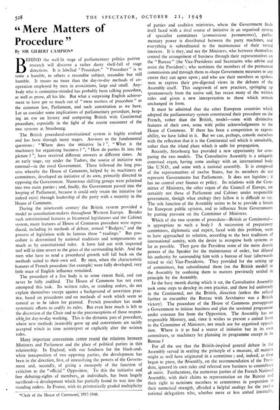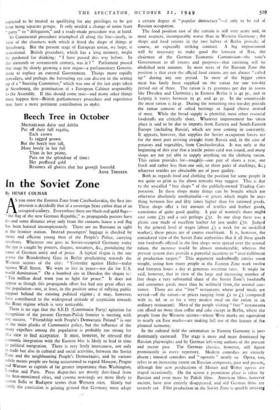44 Mere Matters of
Procedure"
By SIR GILBERT CAMPION*
BEHIND the well-lit stage of parliamentary politics patient research will discover a rather dusty shelf-full of stage directions. It is labelled "Procedure." ." Procedure" is to some a humble, to others a recondite subject, recondite but still
humble. It means no more than the day-to-day methods of co- operation employed by men in associations, large and small. Any- body who is committee-minded has probably been talking procedure, as well as prose, all his life. But what a surprising English achieve- ment to have got so much out of "mere matters of procedure" as the common law, Parliament, and such constitution as we have. Let us consider some implications of parliamentary procedure, keep- ing an eye on history and comparing British with Continental procedure, especially in the light of the recent encounter of the two systems at Strasbourg.
The British procedural-constitutional system is highly evolved and has been through many stages. Answers to the fundamental questions: "Where does the initiative lie ? ", " What is the machinery for organising business ? ", "How do parties fit into the picture ? ", have received different answers at different times. At an early stage, say under the Tudors, the source of initiative was external—in the royal Government. There followed the long pro- cess whereby the House of Commons, helped by its machinery of committees, developed an initiative of its own, primarily directed to opposing the Government. Numerous shifting groups were polarised into two main parties ; and, finally, the Government passed into the keeping of Parliament, because it could only retain the initiative (or indeed exist) through leadership of the party with a majority in the House of Commons.
During the nineteenth century the British system provided a model to constitution-makers throughout Western Europe. Besides such constitutional features as bicameral legislatures and the Cabinet system, many features of House of Commons procedure were repro- duced, including its methods of debate, annual "Budgets," and the process of legislation with its famous three " readings." But pro- cedure is determined by national traditions and temperaments as much as by constitutional rules. A lawn laid out with imported
turf will in time revert to the grass of the surrounding fields. And the men who have to tend a procedural growth will fall back on the methods suited to their own soil. By 1910, when the characteristic features of French procedure (for example) were fully developed, very little trace of English influence remained.
The procedure of a live body is to some extent fluid, and can never be fully codified. The House of Commons has not even attempted this task. Its written rules, or standing orders, do not explain themselves except against a background of unwritten prac- tice, based on precedents and on methods of work which seem so natural as to be taken for granted. French procedure has made systematic efforts to codify its rules. But even here much is left to the discretion of the Chair and to the preconceptions of those respon- siblsjor day-to-day working. This is the dynamic part of procedure, where new methods insensibly grow up and conventions are tacitly accepted which in time reinterpret or explicitly alter the written rules.
Many important conventions centre round the relations between Ministers and Parliament and the place of political parties in this relationship. In England, with our fondness for the black-and- white juxtaposition of two opposing parties, the development has been in the direction, first, of intensifying the powers of the Govern- ment and, secondly, of giving a monopoly of the function of criticism to the " official " Opposition. To this the initiative and free debating-rights of members,as individuals, has been largely sacrificed—a development which has partially found its way into the standing orders. In France, with its prismatically graded multiplicity *Clerk of the House of Commor*'1937-1948. of parties and coalition ministries, where the Government finds itself faced with a rival source of initiative in an organised system
of specialist committees (commissions permanentes), parlia- mentary power is distributed between the party machines, and everything is subordinated to the maintenance of their vested
interests. It is they, and not the Ministers, who between themselves control the arrangethent of business through their representatives on the " Bureau " (the Vice-Presidents and Secretaries who advise and assist the President) ; who nominate the members of the permanent commissions and through them re-shape Government measures to any extent they can agree upon ; and who use their members as spokes-
men to express their pre-digested views in the debates of the Assembly itself. This outgrowth of new practices, springing up spontaneously from the native soil, has recast many of the written rules and given a new interpretation to those which remain unchanged in form.
It must be admitted that the other European countries which adopted the parliamentary system constructed their procedure on the French, rather than the British, model—some with distinctive features of their own, some with polite acknowledgments to the House of Commons. If there has been a competition in export- ability, we have failed in it. But we can, perhaps, console ourselves with the reflection that it is the Continental soil which is unsuitable, rather than the island plant which is unfit for propagation.
Recently, Strasbourg has provided a new opportunity for com- paring the two models. The Consultative Assembly is a uniquely contrived organ, having some analogy with an international body like U.N.O., and some with a national assembly. It is composed of the representatives of twelve States, but its members do not represent Governments but Parliaments. It does not legislate ; it has no control over finance or policy. Its relations with the Com- mittee of Ministers, the other organ of the Council of Europe, are certainly not those of Parliament and Cabinet under responsible government, though what analogy they follow it is difficult to say. The sole function of the Assembly seems to be to provide a forum for European public opinion, and to influence State Governments by putting pressure on the Committee of Ministers.
Which of the two systems of procedure—British or Continental— is appropriate to such a body ? A succession of preparatory committees, diplomatic and expert, faced with this problem, seem to have approached its solution, according to the best traditions of international comity, with the desire to recognise both systems as far as possible. They gave the President some of the more drastic powers of the Speaker for the maintenance of order, but diluted his authority by surrounding him with a bureau of four (afterwards raised to six) Vice-Presidents. They provided for the setting up of committees, but subordinated them (on the British model) to the Assembly by confining them to matters previously settled in principle by the Assembly.
In the busy month during which it sat, the Consultative Assembly took some steps to develop its own practice, and these led uniformly in the Continental, not the British, direction (unless the refusal further to encumber the Bureau with Secretaires was a British victory). The procedure of the House of Commons presupposes a Government to initiate business and plan the sessional programme under constant fire from the Opposition. The Assembly has no responsible Ministry, and, since it wishes to present a united front to the Committee of Ministers, not much use for organised opposi- tion. Where is it to find a source of initiative but in its own committees, or machinery for planning its programme except in its Bureau ?
For all the use that the British-inspired general debate in the Assembly served in settling the principle of a measure, all matters might as well have originated in a committee ; and, indeed, as time began to press, the iiiiembly, on the recommendation of the Pre‘i- dent, ignored its own rules and referred new business to committees ab Furthermore, the numerous parties of the French National Assembly, with their claims to representation on the Bureau and their right to nominate members to committees in proportion to their numerical strength, afforded a helpful analogy for the twel% national delegations who, whether more or less united internally,
expected to be treated as qualifying for any privileges to be got tram being separate groups. It only needed a change of name from " party" to "delegation," and a ready-made procedure was at hand.
So Continental procedure triumphed all along the line—justly, in view of the closeness with which it fitted the shape of things at Strasbourg. But the present stage of European union, we hope, is transitional. British procedure, which has a long memory, might be pardoned for thinking: "I have passed this way before. In the sixteenth or seventeenth century, was it ? " Parliament passed this stage by slowly growing a new organ—a parliamentary Govern- ment to replace an external Government. Things move rapidly nowadays, and perhaps the foreseeing eye can discern in the setting up of a "Steering Committee," which was one of the last steps taken at Strasbourg, the germination of a European Cabinet responsible ta the Assembly. If this should come true—and many other things must happen first—British parliamentary procedure and experience may have a more pertinent contribution to make.



































 Previous page
Previous page